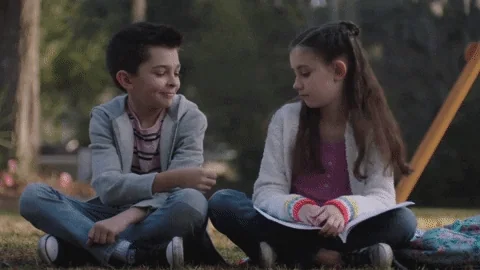
Imagine you were in a huge fight with your sibling. Words were exchanged, everyone was mad, feelings were hurt and you stopped talking to each other. As the days go by, you start to miss their presence, and eventually one of you reaches out to apologize, bringing you back together as best friends, stronger than ever.
This type of love you have for your sibling is called unconditional love.
It’s your love for someone that won’t go away, even with the challenges you may face. It’s accepting a person for who they are and supporting their actions, even when you may not fully agree with them.
Using strategies and skills, you can practiceunconditional love to strengthen your bond and strengthen your relationship with your sibling.
1. Spend quality time together

Put in an effort to spend time with your sibling doing activities that both of you enjoy.
Try doing a shared activity like:
Watching movies: favorite movies or nostalgic movies from childhood.
Playing games: board games or video games.
Talking/catching-up: talk about what's been happening in your life.
It’s important to remember that quality time isn’t just about being together, but also devoting your full attention to spending time together without any distractions.
Time together can help to create a stronger bond and create new memories. You can also learn new things about each other as you spend more time together.
2. Practice conflict resolution

As you spend more time with each other, this can also help you practice conflict resolution. Even if you’re not feeling up for it, the more you communicate with your sibling, the more you learn how to express your feelings and learn new strategies on how to resolve conflict that works for both of you.
Show unconditional love with these conflict resolution strategies:
Use “I” statements: Share how you feel without blaming your sibling. Instead of saying “You never listen to me,” you can say, “I feel ignored when you don’t listen to what I’m saying.”
Take a break if emotions run high: If emotions run high, take a short break to cool down and think more clearly.
Find a compromise: Find a middle ground that both of you agree on. For example, take turns using the TV for an hour each.
Practice active listening: Listen to each other and give your full attention to show you understand their perspective. Ask questions like, “What can I do to make things better? How can we solve this problem together?”
Quiz
You and your siblings are arguing about who gets to use the family computer to play video games. Emotions are running high, and you want to resolve the conflict peacefully? What should you do? Select all that apply:
3. Practice empathy

Empathy is putting yourself in the other person’s shoes to better understand them.
By practicing empathy with your siblings, you can make your sibling feel heard and valued. It can help strengthen the relationship by showing how much you care, and that you're making an effort to better understand their perspective.
To show unconditional love with empathy:
Express understanding to demonstrate active listening: “I can hear that you’re frustrated about this.”
Validate their feelings: “I understand why you feel upset about this. It would make me feel underappreciated too.”
Offer support: “Is there something I can do next time to help you out?”
4. Show up for them

Practice showing up for your siblings to support them practically and emotionally. This can help to ease any stress your sibling may be feeling and also show that your sibling can rely on you.
Show up for your siblings with unconditional love:
Be available and present to hear them out: Set time aside to listen to their problems (it could be homework, problems with friends, needing extra practice with a sport).
Encourage and motivate them: You could say things like: “I know it’s a lot, but I’ve seen you handle tough situations before. You’re so strong and I know you can manage this too.”
Be a safe space for your sibling: You can assure and reassure your siblings it's a safe space for them to discuss anything they want with you without judgement and that they are safe with you.
5. Show gratitude

Gratitude is being appreciative and thankful for something good that happened to you. It’s important to practice this with siblings because you're acknowledging and appreciating their efforts. It shows unconditional love because your siblings will see how much you value them.
Try practicing gratitude with simple actions:
Express appreciation regularly: “Thank you for helping me with this homework,” or “I appreciate you listening to me.”
Acknowledge efforts: “I’ve noticed you've been helping out with chores more! It’s really helpful.”
Give compliments: “The cookies you made were fantastic! You’re like a chef!”
Show interest in their life: “How was your day?” or “I saw that you’re reading a new book, what’s it about?”
Quiz
Your sibling comes home after a rough day, feeling overwhelmed and upset. You want to help them unwind and feel better. Which of these actions would best match the situation? Select all that apply:
Take Action

Practicing unconditional love with your sibling is something that may take a little more work than your normal routine with them but it’ll be all worth it in the end!
Remember to make unconditional love an active part of your relationship:
Your feedback matters to us.
This Byte helped me better understand the topic.
